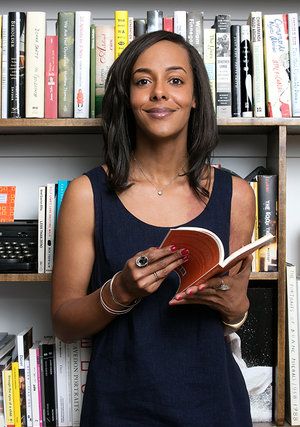 Lisa Lucas is the head of the National Book Foundation, and one of her goals is to make reading fun again.
Lisa Lucas is the head of the National Book Foundation, and one of her goals is to make reading fun again.
Now, if you're reading this—which means you're on LitLovers and thus a devoted reader, you're going, "Wha...???" YOU think reading is already fun.
But some people don't, hard as it is to imagine—and we all KNOW people like that.
My husband, really bright guy (math-&-physics type bright), doesn't read much. While long rows of numbers are beautiful things to him, dense blocks of text are daunting.
Another reason—and you've heard this one—"I don't have time." Well, here's an idea from Lucas on that:
If you read for an hour every single day, you’re reading seven hours a week, which is enough to bang through a decent amount of material if you do that...for 52 weeks.
Other comments about why people don't enjoying reading:
♦ Some people have trouble quieting their minds. They can't sit still; they're the doers & fixers.
♦ I think I lack the imagination, am too impatient, and don't want to THINK about my entertainment.
♦ TV, films, music, and the digital world provide easier methods of entertainment.
♦ Reading takes too much work and takes too long. We have to convert symbols into words and then process the result.
♦ Reading fiction is a waste of useful time.
♦ Inveterate non-readers probably had to read Moby-Dick in the 7th grade and never got over it.
From Quora
That last one—suffering through Moby-Dickin 7th grade—oh, boy! I remember that. And this is where Lisa Lucas believes she might make a difference.
The way we TALK ABOUT LITERATURE CAN STOP CONVERSATION even before it starts. If we can reframe how we talk about connecting readers with literature, and how we want to market that concept of NOT MAKING IT FEEL IT'S SOME KIND OF CHORE, I think we’ll find change.
From New York Times
Well said, Lisa Lucas. Changing minds, and habits, is hard work but a laudable goal. Best of luck to all of you at the National Book Foundation.
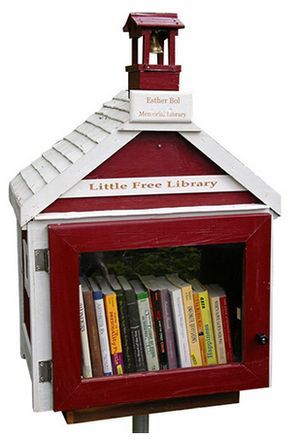 Sometimes little things have big payoffs—which is exactly what's been happening in Detroit, Michigan, a city that's found itself in dire straits over the past several years. And those payoffs? They're something YOUR BOOK CLUB can help generate.
Sometimes little things have big payoffs—which is exactly what's been happening in Detroit, Michigan, a city that's found itself in dire straits over the past several years. And those payoffs? They're something YOUR BOOK CLUB can help generate.
Here's the story. It started with one Little Free Library that Kim Kozlowski installed in her front yard. A returned native, Kim watched the mini-library become a gathering spot for her Detroit neighbors as they stopped to chat while taking a book or returning one. Her Little Library was pulling the neighborhood together. Is there a way, she wondered to take Little Free Libraries citywide?
So Kim made a call to Cindy Dyson, a close friend and a web-designer living Montana. The two did some brainstorming—and Crash! Bang! out popped an idea. Why not start a grassroots movement to turn Detroit into the "Little Free Library Capital of the World"?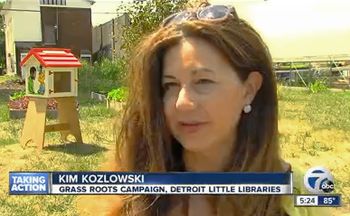 The game was afoot. Kim launched Detroit Little Libraries project in September, 2014, Cindy designed the website, and over the next two years mini-libraries sprung up all over Detroit. In mid-2016, the national Little Free Libraries group, whom Kim collaborated with, honored her by declaring Detroit the FASTEST GROWING LITTLE FREE LIBRARY CITY IN THE COUNTRY. (Btw, Kim accomplished all this while working full-time as a reporter for the Detroit News.)
The game was afoot. Kim launched Detroit Little Libraries project in September, 2014, Cindy designed the website, and over the next two years mini-libraries sprung up all over Detroit. In mid-2016, the national Little Free Libraries group, whom Kim collaborated with, honored her by declaring Detroit the FASTEST GROWING LITTLE FREE LIBRARY CITY IN THE COUNTRY. (Btw, Kim accomplished all this while working full-time as a reporter for the Detroit News.)
Then things got serious. Alycia Meriweather, Detroit's acting superintendent of schools, could hardly miss the tiny libraries popping up on lawns and sidewalks all over the city. They gave Alycia had an idea, so she reached out to Kim Kozlowski.
Like Kim, Alycia believed that literacy is one of the fundamentals needed to turn any city around. Yet the book shortage in Detroit's school system is abysmal. The idea: a project to install a Little Library in each of DETROIT'S 97 SCHOOLS—in 97 DAYS!
How are they doing? Well, the project was just launched, and it's already receiving tremendous community support, to say nothing of press attention, local and regional.
This is where YOU come in. Detroit's project is a terrific opportunity for any book club looking for a way TO GIVE BACK. It's the ideal project for anyone who believes in the power of reading to change lives.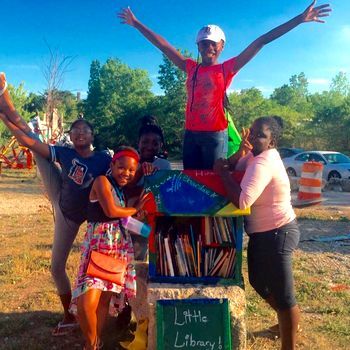 Cindy Dyson, the web designer, contacted us at LitLovers to tell us the story and to say that HER book club—all the way out in MONTANA—has pitched in for a Detroit Little Library. Even her mother's book club in ALASKA has joined in...and a visitor at her mother's club that day—from NEVADA—took the concept back home to her book club.
Cindy Dyson, the web designer, contacted us at LitLovers to tell us the story and to say that HER book club—all the way out in MONTANA—has pitched in for a Detroit Little Library. Even her mother's book club in ALASKA has joined in...and a visitor at her mother's club that day—from NEVADA—took the concept back home to her book club.
So click on 97 Days / 97 Schools image (above left)...and learn how YOUR BOOK CLUB can help. You can make a simple donation, or you can purchase a ready-made library model to be installed and filled with books on your behalf. A small act ON YOUR PART can make a big difference—in a city that's working hard to make a difference.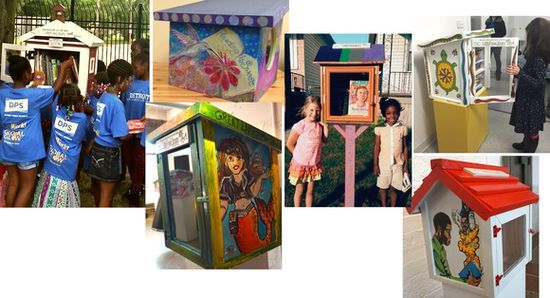
 I've said this before, but it bears repeating—we readers are a lucky bunch to have OTHER people willing to write novels for us. I certainly can't do it.
I've said this before, but it bears repeating—we readers are a lucky bunch to have OTHER people willing to write novels for us. I certainly can't do it.
Here's what author Amos Oz has to say on wriitng:
It is like reconstructing the whole of Paris from Lego bricks. It’s about three-quarters-of-a-million small decisions. It’s not about who will live and who will die and who will go to bed with whom. Those are the easy ones.
It’s about choosing adjectives and adverbs and punctuation. These are molecular decisions that you have to take and nobody will appreciate.... That is the business of three-quarters-of-a-million decisions.
Wait...that's the hard part? PUNCTUATION? Nah, that's nowhere near the hard part. When someone says to me (and people have surely said it to you), "You should write a book," MY JAW DROPS in dumb wonderment. Just how smart do people think I am? (I'm not.) Even more to the point, just HOW EASY do they think writing novels is? (It isn't.)
A BAZILLION Legos—not a million—go into novel writing. Here's just some of the stuff authors have to think about—stuff we take for granted but then get ALL TETCHY over if authors get it wrong:
- WHO will tell the story, whose voice (or voices) will be used? (It better be a convincing.)
- WHAT information will be withheld? When will it be revealed? Who will reveal it, and how?
- IS the dialog believable—is it the way people really speak? (Not so easy.)
- HOW much research is needed to establish setting—location and era.
- HOW will the characters be shaped; how much depth will they be given; what will make them life-like and compelling?
- HOW will the plot be structured—what's the arc of the story?
- WHAT underlying concerns, themes, or ideas will suffuse the book? What big questions does the author want to explore?
- WHAT about all the literary stuff—imagery, symbolism / metaphor, irony, and allusions—which gives the story richness and resonance?
Writing is a hard-knock life. Too hard for the likes of me. AND YET, it's remarkable, isn't it, that with the rise of web-based self-publishing, lots and lots of people are heading to the key board to try their hand(s) at writing books.
Bless them one and all. They are BRAVE SOULS, brave souls indeed!
 Cool photo...could be right out of Anne Fadiman's Ex Libris: Confessions of a Common Reader—a terrific collection of essays about a lifetime spent in the pursuit of books: reading, writing, and collecting them. (The author is best known for The Spirit Catches You, You Fall Down, 1997.)
Cool photo...could be right out of Anne Fadiman's Ex Libris: Confessions of a Common Reader—a terrific collection of essays about a lifetime spent in the pursuit of books: reading, writing, and collecting them. (The author is best known for The Spirit Catches You, You Fall Down, 1997.)Here's what happened: Having sublet her apartment, Fadiman returns home from a lengthy trip. It turns out her subleasers are two design-oriented guys who thought they'd do her a favor and spiff the place up a bit.
So what did they do? They rearranged her bookshelves. Nothing practical mind you, like genre, subject, or author name...no-no-no. That would be PROSE-AY-ICK. They reorganized the books by—you guessed it—COLOR. And Fadiman? Amused...and horrified.
Well, I've got some pretty spiffy bookshelves myself, built by Victorians 120 years ago. Here's what mine look like.
 A beautiful mess. Books are crammed in topsy-turvy and arranged willy-nilly, with no claim to the niceties of decor or organization. It's all DVDs, old Disney videos, kids crayons, cookbooks and wine glasses (off to the left), along side Shakespeare (my grandfather's 1920s set).
A beautiful mess. Books are crammed in topsy-turvy and arranged willy-nilly, with no claim to the niceties of decor or organization. It's all DVDs, old Disney videos, kids crayons, cookbooks and wine glasses (off to the left), along side Shakespeare (my grandfather's 1920s set).Bookshelves are deeply personal things. This lovely mess has meaning: it reflects a sort of "what-you-see-is what-you-get" approach to our lives. More importantly, the mess contains a good bit of family history, giving us pleasure just to look at it.
So how personal are your bookshelves—what do they say about you? Finally (and we've talked about this before), how much longer will bookshelves grace our homes? What will we lose when everything is digitalized. And, yes, I ♥ my Kindle.
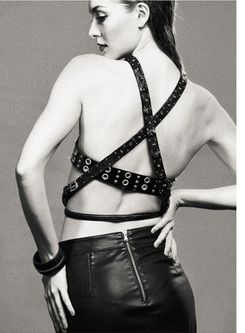 Boy! Girls are taking a hit these days—in the myriad books written and millions of readers propelling them to the top of the charts.
Boy! Girls are taking a hit these days—in the myriad books written and millions of readers propelling them to the top of the charts.
The girls I'm referring to are those fictional sociopaths, Amy (Gone Girl), Jodi (Silent Wife), Rachel (Girl on the Train), and most recently Lacey and Dex (Girls on Fire). *
Then there's Peggy Orenstein's nonfiction Girls & Sex about the troubling state of affairs as young women negotiate their way in the brave new world of hook-up sex.
Do notice, btw, the frequent use of "girl" in the titles. A "girl" is a young female lacking the stature—and substance—of a mature woman. Like what's up with that? (See later post on Girly Girl Titles.)
Marketers are surely taking a title cue from Steig Larsson's spectacularly successful "Girl with the Dragon Tattoo" series. But Larsson's heroine, Lisbeth Salander, while outlandish, is a cut above the new "girls." Amy, Jodi, Rachel, and friends are downright ... frighteningly ... pathological.
Yet these books are cresting the bestseller charts...because we readers are scooping them up.
So what wave are these books riding? Something's up—some anxiety or unease within women, or about women, which these hugely popular books are playing into. What an interesting topic for book clubs to take up!
My 20-something daughter says it's about time: Males have long been cast as psychopaths, and women are just catching up—a sign of equity in her eyes. Well, maybe.
Except that these books are coming out fast and furiously—one after another—and hitting the charts in a HUGE way. It's puzzling. For some reason, we can't get enough of GIRLS GONE BAD. Why is that? (Also take a look at a previous post: Gone Girl Marriages—Creeping Us Out.)
* JUST RELEASED . . .
Add to our list the newest girls-gone-bad novel, The Girls by Emma Cline, based on the Charles Manson cult murders. These bad girls got the publishing world so worked up that author Cline walked away with a cool $2 MILLION. And this is her first book!
 ritten by Cheryl Jones* for LitLovers.
ritten by Cheryl Jones* for LitLovers.We all know reading to youngsters is important. But aside from the pure joy we feel, it's easy to overlook why it's so important.
Take a look at these highlights from a study conducted by the Melbourne (Australia) Institute of Applied Economic and Social Research.
Reading to Young Children
------A Head Start in Life
--------—Ages 4 to 5—
♦ Reading to this age group has a significant positive effect later in life—on reading (language & literacy) and cognitive skills (numeracy & cognition).
♦ Children read to more frequently achieve higher scores on the [Australian] National Assessment Program for both Reading and Numeracy for ages 8 to 9.
♦These differences in reading and cognitive skills are not related to the child's family background or home environment.Authored by: G. Kalb and J.C. van Ours, 2012
Print size matters. Based on work by Glenn Dorman, a child development specialist, young children’s eyes are still developing, which is why lettering in children's books is so large (small letter aren't helpful). Good rule of thumb: the younger the child, the bigger the letters.
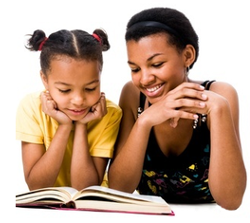 Frequency matters, too. According to the Melbourne study (above), reading to children 3-5 days a week advances reading skills by six months. Reading 6-7 days a week can advance their skills by a full year!
Frequency matters, too. According to the Melbourne study (above), reading to children 3-5 days a week advances reading skills by six months. Reading 6-7 days a week can advance their skills by a full year!One reason early reading is so beneficial is that it strengthens vocabulary and thinking skills—enabling children to ask questions when they're presented with difficult new material. The greater the vocabulary, the easier it is to ask for help.
Other studies over the years have shown that when children fall behind in the lower grades they often stay behind in the upper grades. Worse, they're at risk of dropping out later on.
 A love of reading is a precious gift to give a child. And as every person who visits LitLovers knows, learning doesn't end with high school or college—which is why you happen to be here, reading this, right now.
A love of reading is a precious gift to give a child. And as every person who visits LitLovers knows, learning doesn't end with high school or college—which is why you happen to be here, reading this, right now.Starting early with reading not only gives kids an extra boost when they're young—it turns into an advantage for life. It can be a key factor in keeping them engaged in school, as well as keeping them in school. And, importantly, it can inspire in them a life-long love of reading—just like you.
*Cheryl Jones is a blogger and a free-lance witer. Visit her blog here.
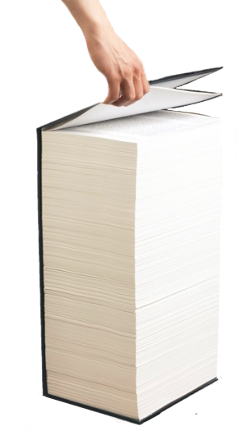 case you hadn't noticed, the novel seems to be getting longer and longer, some clocking in at 700-800+ pages.
case you hadn't noticed, the novel seems to be getting longer and longer, some clocking in at 700-800+ pages. In a gag news article we wrote a while back, we riffed on the idea of authors taking performance enhancing drugs, enabling them to pound out longer and longer sentences, leading to "stupefyingly longer" books.
Now someone's pushing back. Although publishers have pressed him "to write longer books," Welsh author Cynan Jones praises the short novel.
He points to The Old Man and the Sea, They Shoot Horses Don't They?, Animal Farm, even Gatsby (though Fitzgerald worried it was too short). Here's Cynan Jones on the subject:
I've never met a reader who doesn't like short novels.... For me, the opportunity to sit somewhere for two hours and read a book from start to finish—to submerge myself in it—is a thrilling experience. A short novel makes a straightforward demand: give me this time.Readers don't buy books by the the pound, Jones points out. And publishers should get over their obsession with longer works. "The only thing to be taken into account should be the impact a piece of writing has," says Jones. Yep, we couldn't agree more.
Cynan Jones is the author of The Dig and, more recently, Everything I Found on the Beach. The full article can be read in Publisher's Weekly.
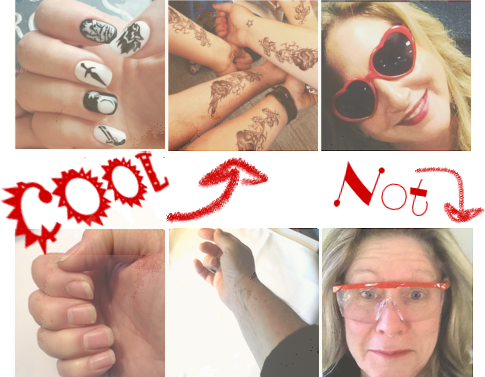
By Molly Lundquist, LitLovers.
Who doesn't want to be cool? Well, my friends, THIS is what cool looks like … and what it doesn't.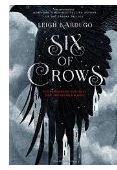 I'm a wanna be. Just when I deluded myself that—after all these years—I might be getting close, here comes LEIGH BARDUGO, author of the Grisha Trilogy (Shadow and Bone, etc.)
I'm a wanna be. Just when I deluded myself that—after all these years—I might be getting close, here comes LEIGH BARDUGO, author of the Grisha Trilogy (Shadow and Bone, etc.)
And now Leigh's got a brand new fantasy novel—Six of Crows, published to rave reviews. Think Oceans Eleven with a bunch of adolescents.
Not only is the book cool, but take a look at the photos of Leigh and friends on Instragam. Top row is Leigh. Bottom… guess who. Me. Cool? Not even close.
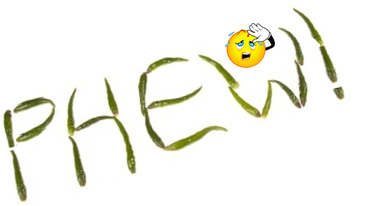 It might be time to remove BOOKSTORES and LIBRARIES from the list of endangered species!
It might be time to remove BOOKSTORES and LIBRARIES from the list of endangered species!
Over the past several years, those dealing in print books were preparing themselves for extinction. With ebook sales skyrocketing, it looked as if end times were on the horizon. But that may have changed.
According to the Association for American Publishers (AAP), digital ebook sales have dropped—by about 10%. Okay, that's not a lot, but it's enough to give books-on-shelves some wiggle room...and booksellers some hope. *
Adding to the good news, the American Booksellers Association (ABA) says its member bricks & mortar bookstores have increased their numbers over the past five years—from 1,400 to 1,700.
Moreover, some surveys show that young readers, the ones in love with digital devices, still prefer reading on paper.
Not that we readers are leaving our digitial devices behind: it's more like we're becoming "hybrid readers," toggling from hard copies to ebooks. I'm a hybrid—I love my Kindle but also enjoy the feel of a print book. You can read more in the New York Times.
So what about you? Are you a hybrid reader, strictly ebooks, or strictly paper ones?
* This just in . . . Publishers Weekly reported that April, 2016, book sales rose 8.8% over March—which means bookstore sales have risen every month this year compared to 2015. Even more impressive, bookstore sales have outpaced growth for the entire retail segment for the first five months of 2016.
 Ah, Pinterest—all those lists and photos of the BEST PLACES TO READ...inside, outside, in cities around the world. But the novelty's wearing thin.
Ah, Pinterest—all those lists and photos of the BEST PLACES TO READ...inside, outside, in cities around the world. But the novelty's wearing thin.
And that got us to thinking—perversely—about where you DON'T want to be caught with a book. So we put together our own list. This one is about . . .
THE 7 WORST PLACES TO READ
1 — Job Interview
Terrific resume. Great experience. Top-notch references. And there you sit, peering down at a book—just to prove you can multi-task. Gee, how could they not hire you?
2 — Lunar Landing Craft
You wanna screw this up? Your one big shot at making history? The world is watching, so put the book down—now—and land this baby.
3 — Parent-Teacher Conference
You think you're showing off your reading skills—which have rubbed off on your gifted kid. But while you sit there with your nose in a book, the teacher?...well, she thinks differently.
4 — Speeding Traffic
Eyes on the road; hands on the wheel. Do we really need to explain this one?
5 — Tax Audit
That's right, just keep on reading. Nonchalance implies innocence. He'll see right through you.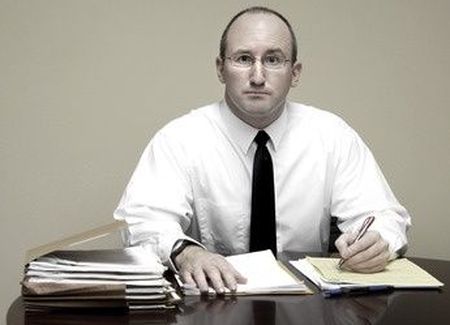
6 — Real Bedroom
This isn't on Pinterest—because this is LIFE. Picture yourself curling up here with a book and a Pinot. You can't, can you?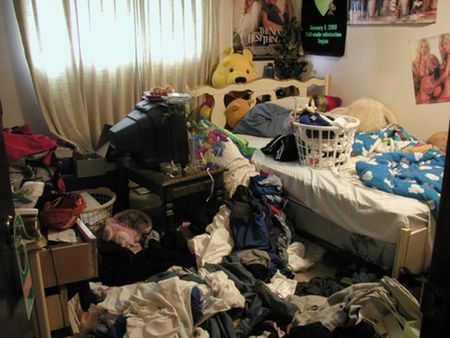
7 — Empire State Building
You could accidentally drop your book from the Observation Deck—you would see it accelerate at (32 ft. per sec.)2, hitting the ground in 15 sec. at a terminal velocity of 50 mph. And THAT would crack the book's spine—which everyone knows is a crying shame.
So, dear reader, you tell us...what's YOUR worst place to read?

